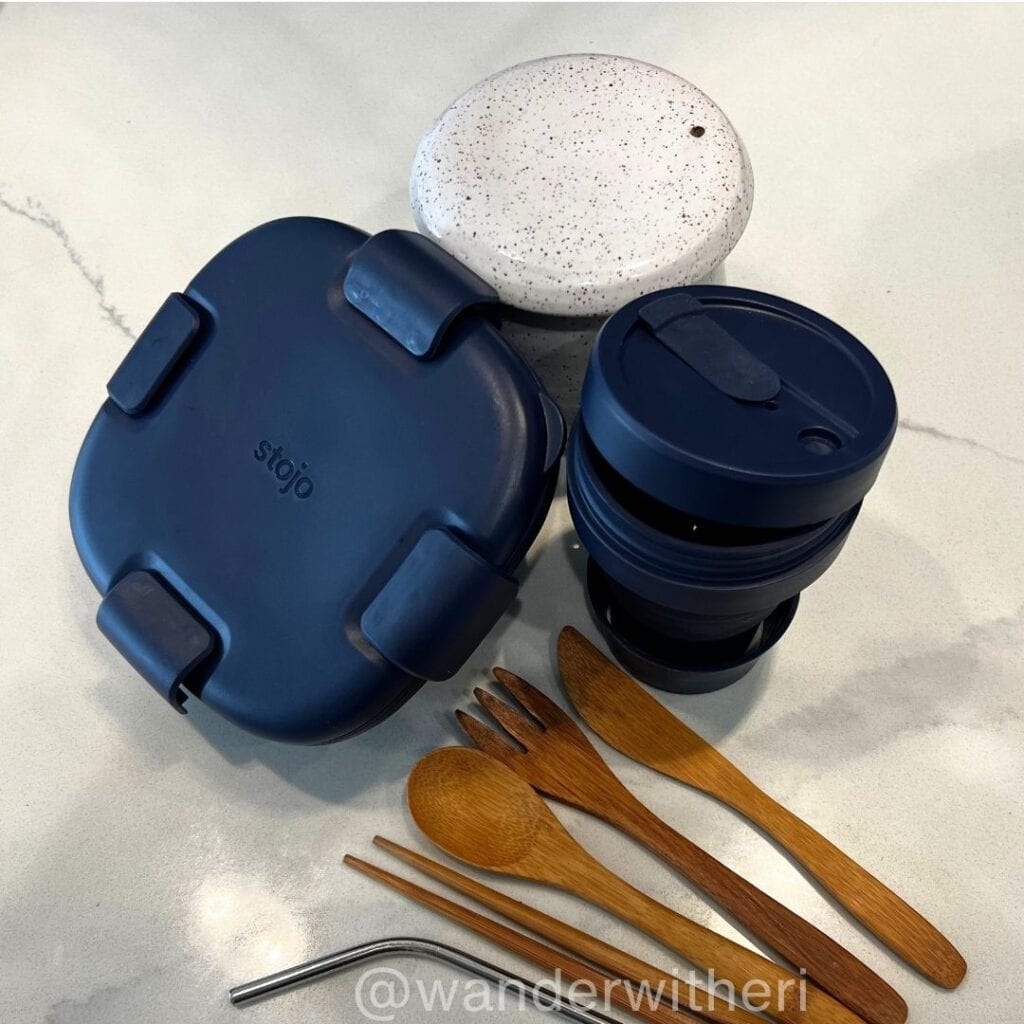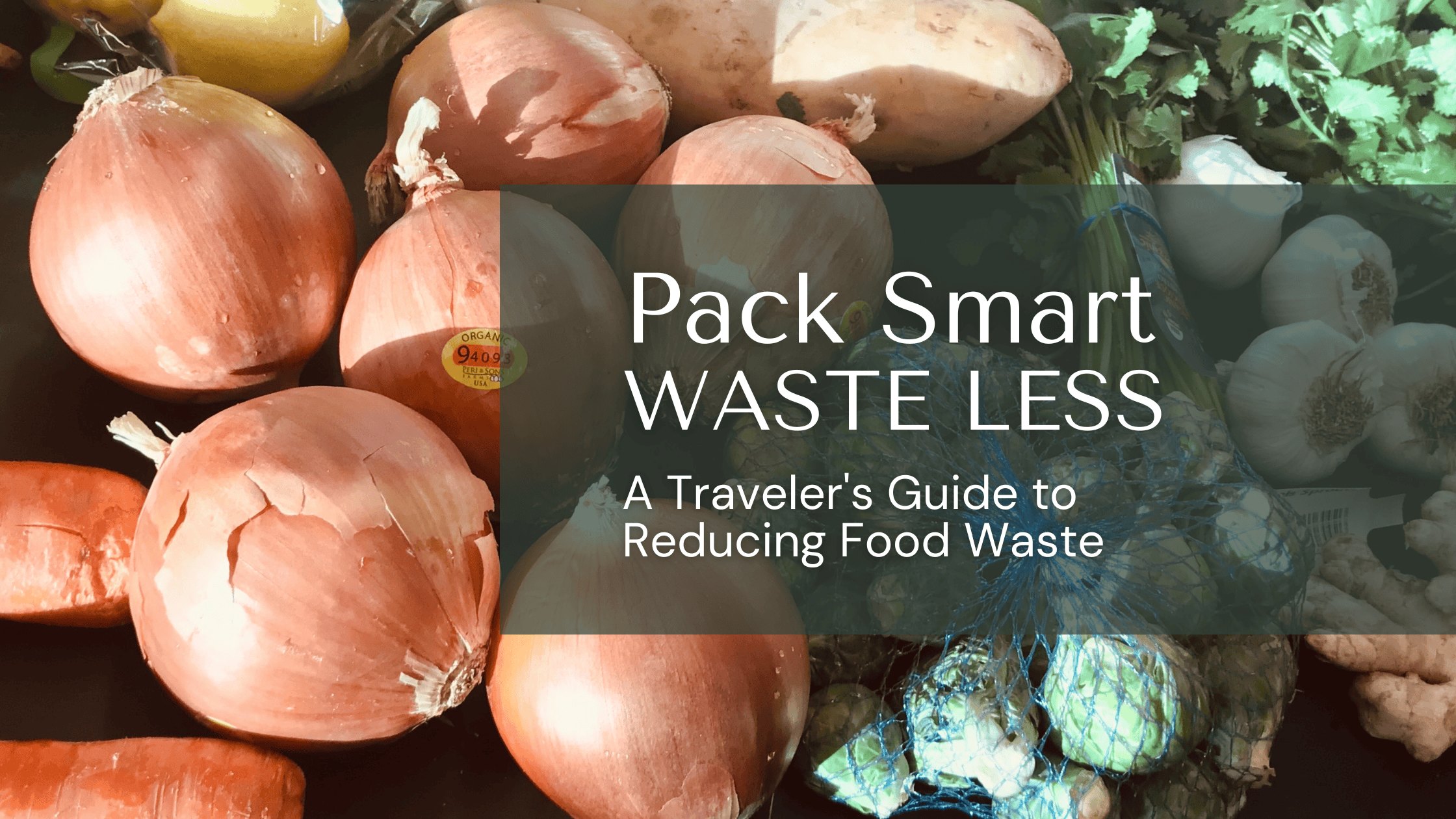One of the best ways to experience culture is through cuisine.
Don’t get me wrong, I love trying local foods as much as the next person, but travelers can also play a role by making conscious choices about what and how much food they consume. On average, the tourism industry is responsible for upwards of 9% of global food waste, including 79,000 tonnes generated by hotels worldwide.
The way food is handled has significant economic, social, and environmental impacts on tourism destinations and businesses. Let’s explore how to minimize food waste while experiencing the world’s culinary delights.
3 Key Takeaways:
- Simple tools like reusable containers and proper planning can significantly reduce travel food waste
- The tourism industry contributes to 9% of global food waste, but travelers can make a difference
- Sustainable choices enhance rather than compromise authentic travel experiences

Essential Tools for Minimizing Food Waste in Travel
Food portions are the biggest flub in food waste. As a traveler, I may not understand portion sizes if there isn’t a photo, so I always ask or translate questions regarding portion sizes to avoid the pitfalls of over-ordering.
If you order more than you can eat, ask for a take-out box or container that is not plastic. I understand some cultures that could be seen as offensive as meals are meant to be enjoyed at a restaurant. I would ask if they have a compost or partner program, like Too Good to Go that can ensure food isn’t wasted. I carry my collapsable Stojo container. Compact and small, easy to put in a backpack or tote bag. You never know if you might get hungry later after exploring or if there is someone else in need. Other alternatives for takeout or preserving food:
- Reusable beeswax wraps for produce or takeout
- Bamboo or wooden cutlery for dining on-the-go or picnics (to avoid using plastic utensils)
- Collapsible silicone containers and beeswax wraps for storing leftovers and market purchases
- Compost when possible — many cities have pick-up or drop-off compost programs, like Compost for Life
Culprits of Food Waste: Conferences, Cruise Ships, and Buffets
Large-scale food service operations in the tourism industry are significant contributors to food waste. Here’s how they can make a difference:
Conference Centers
Food waste at conferences represents a significant environmental and financial challenge. With fluctuating attendance numbers, diverse dietary requirements, and the pressure to provide abundant catering options, conference venues often err on the side of over-preparation. Studies indicate that conference events can waste up to 30% of the food prepared, contributing to both environmental impact and unnecessary costs. Here are some ways to reduce food waste:
- Implement precise headcount systems and RSVP tracking to avoid over-preparation
- Partner with local food banks to donate unused, properly stored food
- Use digital platforms to track attendee dietary preferences and restrictions
- Offer smaller portion sizes with the option to get seconds
Cruise Ships
Cruise ships are notorious contributors to food waste in the tourism industry. A typical cruise ship, carrying between 3,000 to 6,000 passengers, can generate approximately 1 ton of food waste per day. This massive scale of waste occurs due to several factors:
- The all-inclusive dining model encourages overconsumption and waste
- 24/7 food service requires constant food preparation and overproduction
- Strict maritime health regulations often require the disposal of untouched food
- Large-scale buffet operations lead to significant overproduction
Beyond food waste, cruise ships face broader sustainability challenges. They consume vast amounts of fuel, generate significant greenhouse gas emissions, and produce large quantities of wastewater. A single cruise ship can use up to 250 tons of fuel per day, equivalent to the emissions of thousands of cars.
To address these issues, some cruise lines are implementing innovative solutions:
- Install food waste tracking and analytics systems in kitchens
- Train staff on proper portion control and food storage techniques
- Convert food waste into biogas or compost where possible
- Implement made-to-order stations instead of pre-made bulk items
Buffet Restaurants
Buffets are one of the most significant contributors to food waste in the travel and hospitality industry. The “all-you-can-eat” model often encourages overconsumption and leads to substantial waste. On average, buffet restaurants throw away 15-20% of the food they prepare. Some ways to offset food waste:
- Use smaller serving containers and replenish more frequently
- Price by weight to discourage over-serving
- Display information about portion sizes and waste reduction
- Implement time-based pricing to encourage off-peak dining
These venues can also consider implementing AI-powered demand forecasting systems to better predict food needs based on historical data and booking patterns.

Reducing Food Waste
Mindful travel doesn’t mean compromising on authentic culinary experiences. By incorporating smart shopping practices like using reusable produce bags and supporting local farmers’ markets, travelers can significantly reduce their environmental footprint while discovering authentic local cuisine. Apps like Too Good To Go and eco-friendly containers from brands like Stojo make it easier than ever to manage food waste responsibly.
Remember, every small action counts. Whether you’re exploring street food markets, dining at family-owned restaurants, or taking local cooking classes, your conscious choices contribute to a more sustainable tourism industry. By embracing these waste-reduction strategies, you’ll not only enhance your travel experience but also help preserve the destinations you love for future generations.
Let’s Connect
- Are you looking to elevate your travel or tourism brand? Or looking to get personalized travel planning assistance? I’d love to help you on your journey and create greater awareness of responsible travel!
- 📧 Email: Let’s chat about your travel goals – drop me a line
- 📱 Social Media: Follow along on Instagram @wanderwitheri for daily travel inspiration and tips

